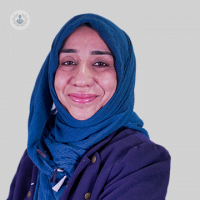Postnatal bladder problems: What you need to know
Written by:Unfortunately, many women develop bladder problems after giving birth. In her latest online article, highly experienced consultant obstetrician and gynaecologist Ms Sameena Muzaffar explains how common these bladder problems are, what causes them and how they can be treated.

What are common postnatal bladder problems?
One of the most common postnatal bladder problems is stress incontinence. Approximately 1 in 3 women will experience this condition at some point after childbirth.
Another common problem is the inability or difficulty passing urine after childbirth, occurring in 0.7-4% of patients. This is known as voiding dysfunction.
What causes bladder problems after pregnancy?
Most bladder problems are attributed to the weakening of the pelvic floor muscles. Additionally, the bladder can suffer trauma from the pressure during childbirth, especially in instrumental deliveries.
When should I consult a doctor for postnatal bladder problems?
- Stress incontinence: In the majority of cases, it resolves within the first couple of weeks. If it persists, it is advisable to initiate pelvic floor exercises and schedule an appointment with your doctor.
- Voiding dysfunction: This condition will be diagnosed at the hospital after childbirth, and appropriate management will be implemented.
How are bladder problems occurring after pregnancy treated?
Stress incontinence is primarily treated through pelvic floor exercises (PFE). If PFE does not yield improvement, you will be referred to a hospital specialist who will conduct a urodynamics test and discuss surgical options. Please refer to the NICE decision aid for stress incontinence for more information.
Voiding dysfunction is typically managed by inserting a catheter. In the majority of cases, the catheter is removed within 24 hours, and bladder function returns to normal. Some patients may require a catheter for an extended period, occasionally up to 4 weeks.

Can lifestyle changes help?
Yes, lifestyle changes can significantly improve the situation. Some practices you can adopt include:
- Regular pelvic floor exercises
- Maintaining a healthy weight and losing weight if recommended by your doctor
- Avoiding heavy lifting
- Preventing constipation
How long does it usually take for postnatal bladder problems to resolve?
In most cases, postnatal bladder problems resolve within one year. However, if left untreated, they can potentially become lifelong conditions.
If you would like to request a consultation with Ms Sameena Muzaffar, you can do so today via her Top Doctors profile.


